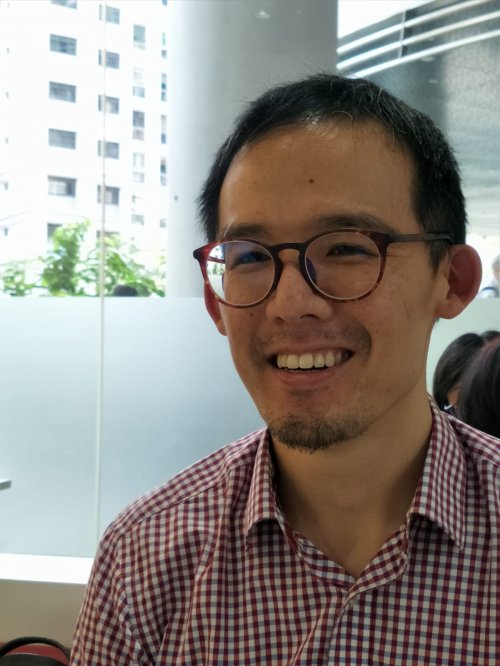By Syadiyah Adlina Binte Suhaimi
Diploma in Creative Writing for TV and New Media
Singapore Polytechnic

Singaporean author and Literature teacher doesn’t believe AI can replace human poets (Photo credit: Syadiyah Adlina Binte Suhaimi)
Netflix killed the DVD and video rental industry. Dropbox and Google Drive are making a dent in data recovery services. The bar soap, diamond, and napkin industries were taken down by the millennial generation. Both technology and millennials have one thing in common: they are the future.
But what links them to 33-year-old Loh Guan Liang, the winner of the 2011
Moving Words Poetry Competition? Well, as a Literature teacher and a poet he has the unique perspective of contemplating the two things shaping tomorrow’s writing.
Technology Overtaking Human Poetry?
Ours is an uncertain world where computers and Artificial Intelligence are replacing humans in many fields. But Guan Liang is unconcerned about poetry-writing robots.
“They can create something, but whether it has soul in it remains to be seen,” he says.
He examines a computer-generated poem handed to him. It was accepted for the Duke Literary Journal by an editor who didn’t realise it was auto-generated. Guan Liang acknowledges that it does look like a poem written by a human. However, on closer inspection he finds that the images don’t add up to anything meaningful.
He reads another shorter poem, also generated by a computer. He admits it is better than the first, but attributes it to the structure of the poem which is quite repetitive and “able to mask the machine-ness of the poem”.
He goes on to say that poetry is abstract and plays with language the way conventional writing doesn’t, which computers might not be able to pick up on.
“If you think of machine writing as going by a set of rules, poetry resists those rules, which is why it won’t work,” he concludes.
Future Writers
He isn’t worried about what lies ahead for the literary scene in Singapore either. As a Literature teacher since 2010, Guan Liang says he is seeing more students who are writing, thanks to social media sites like Instagram and Twitter. He reiterates that students have been writing since back in his day, often scribbling in notebooks for themselves. The difference now is “with social media what they write becomes more obvious”.
Social media is also becoming increasingly visual. Text gets paired with images, which influences the fundamental nature of writing, he says.
“More thoughts come not just into writing but also the packaging of the product because you’re presenting it for people to see and you want people to like it, re-tweet it and share it.”
And Guan Liang believes the future is in safe hands.
“Just because you’re writing for other people, it doesn’t make it less authentic, because ultimately it still comes from you.”
Guan Liang, whose last poetry collection Bitter Punch was published in 2016 and shortlisted for the Singapore Literature Prize, is now trying his hand at writing prose. He plans to work on prose before he embarks on a third poetry collection, which he says will stray from his first two. His earlier collections, Transparent Strangers and Bitter Punch, centre around the loneliness in the city.
“For the third one, I’m not going to rush it. When it comes, it comes.”
Comments
There are no comments for this entry yet.
Commenting is not available in this channel entry.